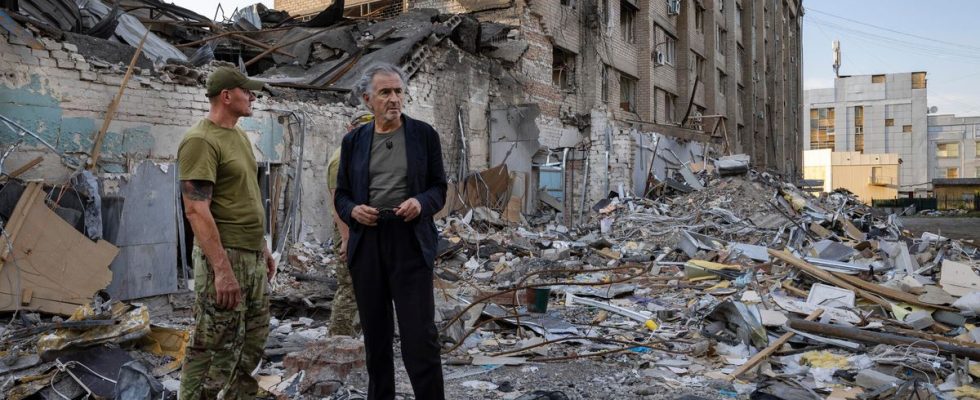This is the third film that Bernard-Henri Lévy has made on Ukraine. In 2022, it begins with “Why Ukraine”, which Arte broadcasts. At the start of this year, we discovered at the cinema Slava Ukraine. Today, with “Ukraine at the heart”, on France 2, he follows the second Ukrainian counter-offensive, which took place last summer, day by day. He takes us to the trenches of Bakhmut or Kherson, shows the destroyed hospitals and bombed schools, meets Russian citizen-soldiers and prisoners. “I believe, since the first day, that it is the future of Europe that is at stake here”, he indicates in a note of intent.
Immersive filming
The documentary begins with the destruction of the Kakhovka dam, in the Kherson region, on June 15, and ends a few days after the start of the school year, in mid-September. “It’s immersive filming, perhaps even more so than in previous films,” summarizes Bernard-Henri Lévy. There is no theory or ideological considerations. It really is a travelogue. What strikes me is that this army, these Ukrainian people, constantly oscillate between desolation and hope. This war is becoming more and more terrible, on the part of Russia.” He also evokes a conflict where “the mud of the trenches and the permanent threat of drones” combine, which, in the long term he believes, “has something terrifying”.
Then he explains: “A film like this is truly a human adventure. With Marc Roussel, my co-director, we arrive in Kherson, without knowing where we are going next. We kept coming back to this area of Bakhmout over the course of these three months. For what ? No plan… A chain of circumstances… We only filmed day by day, and because we established, over time, relationships of trust and fraternity with the Ukrainians.” He also cites one of the sequences from the documentary which seems important to him: the one where he asks some questions to Russian prisoners. “We wanted this scene because it is like a portrait, a terrifying survey, on the state of the Russian army. These three prisoners were not chosen. They were just those from July 17. And I’m not sure they’re 100% representative either. But, all the same, what are they telling us? Demoralization. Unpreparedness. The commanders who sell them like slaves. They lack the real fuel for victory, which is morale. You can only win a war when you know why you’re fighting it! On the Ukrainian side, it is the opposite. Their morale remains undamaged. And that, honestly, commands respect.”
Opinion fatigue
After broadcast in prime time on France 2, this documentary will be released on the big screen in the United States on December 6, with a preview in the United Nations. “What do we expect from this programming across the Atlantic? An effect on opinions…. Let them not forget! Until now, I have been interested in forgotten wars. This is a potentially global central war. Well our goal, with Roussel, is that it does not become a forgotten war. That would be the worst. And that’s the goal of the film: to help ensure that the Ukrainian war does not join this hell of forgotten wars that I know too well. For Le Monde, a few years ago, I covered the wars in Darfur, Angola, Burundi, etc. All forgotten. So double horror.”
When we then mention the conflict in the Middle East which currently captures a large part of the media attention, the philosopher continues: “It has been clear for almost two years that this war began: the main enemy of the Ukrainians is indifference, fatigue of opinions. That’s why we made not one, not two, but three films. Obviously, the tragedy of October 7 further increases this risk of opinion fatigue. But the risk was there from day one.”
Subsequently, Bernard-Henri Lévy wishes to return to philosophy and does not know if he will start a new documentary. “I hope this film will be the last and that the Ukrainians will win the war.”

